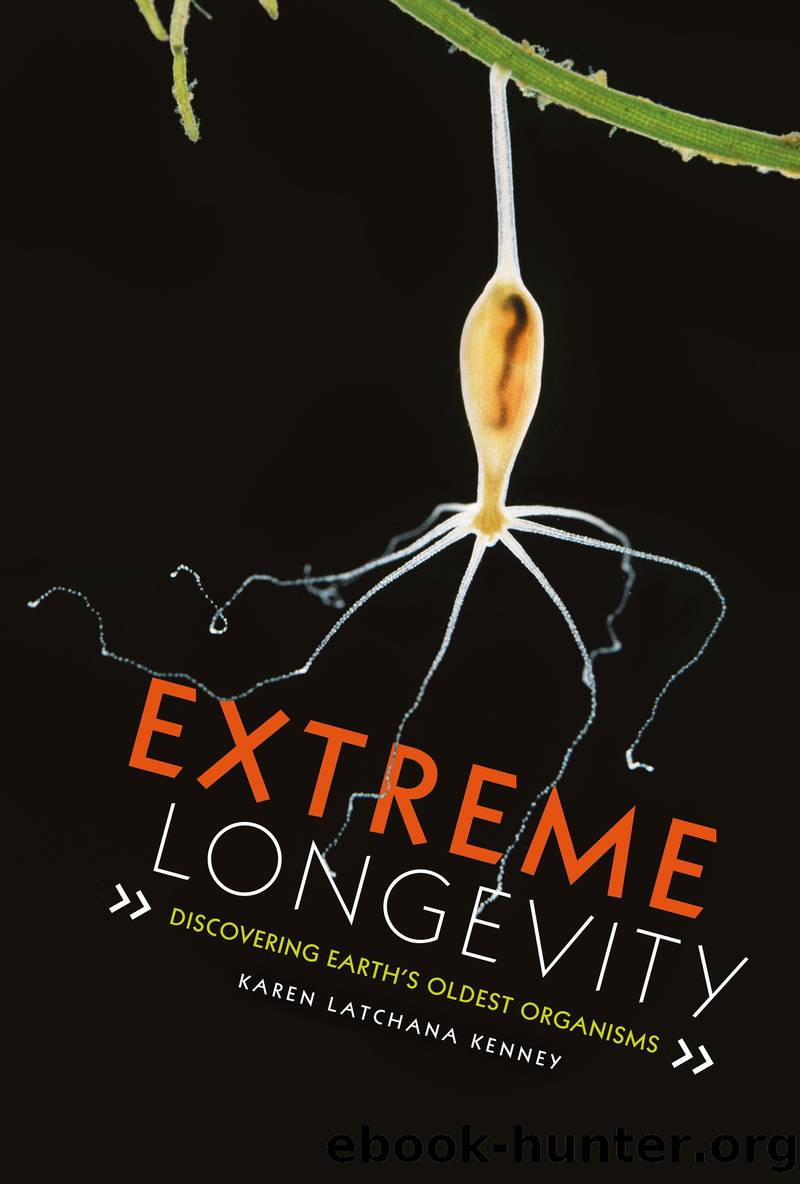Extreme Longevity: Discovering Earth's Oldest Organisms by Karen Latchana Kenney

Author:Karen Latchana Kenney [Latchana Kenney, Karen]
Language: eng
Format: epub
Tags: Aging, Alison Cree, Alzheimer's disease, Anatomy & Physiology, Ancient Animals, Ancient Trees, Animal, Animal Characteristics, Animals, Aspartic Acid Racemization, Baleen, Biological Blueprint, Biology, Bomb Lance Harpoon, Bomb Lance Harpoons, Bomb Pulse, Bowhead whale, Bowhead Whales, Bristlecone Pine Tree, Bristlecone Pine Trees, Caenorhabditis elegans, Cancer, Carbon 14 dating, Cell, Cell Repair, Cells, Cells and Aging, Centenarian, Centenarians, Challenger Expedition, Charles Darwin, Climate Change, Clonal Plants, Creosote bush, Cyanobacteria, Daniel Martinez, Dating Creosote Bushes, Dating Fossils, Dating Trees, Death, Death & Dying, Dendrochronology, Deoxyribonucleic Acid, Differentiation of Cells, Division of Cells, DNA, Dying, Evolution, Extreme Longevity, Fossil, Fossils, Gastrotrich, General Sherman, Genes, Giant Tortoise, Giant Tortoises, Glass Sponge, Glass Sponges, GPS, Greenland Shark, Greenland Sharks, Harpoon, Harpoons, Human, Human Life Span, Humans, Hydra, Hydra vulgaris, Hydras, Inupiat People, Jeanne Louise Calment, Joao Pedro de Magalhaes, Julius Nielsen, Kakapo, Karen Latchana Kenney, King Clone, Life Cycle, Life Cycles, Life Science, Little Brown Bat, Little Brown Bats, Longevity, Maori People, Mapping Gene, Mayflies, Mayfly, Metamorphosis, Methuselah, Ming, Naked Mole Rat, Natural Selection, Nature, Nonfiction, Ocean Animals, Old, Old Animals, Old Trees, Oxidant, Oxidants, Pamela Reid, Pando, Paul Rogers, People, Photosynthesis, Physiology, Quahog, Quaking Aspen, Quaking Aspens, Rate-of-Living Theory, Reef, Reefs, Remotely Operated Vehicle, Remotely Operated Vehicles, Reproduction, Reptiles, Research, Researcher, Researchers, ROV, ROVs, Sally Leys, Science, Science & Nature, Nature & How It Works, and How It Works, Scientific Nomenclature, Scientist, Scientists, Scientists and Researchers, Sequoia, Sequoia Trees, Sequoias, Shin Kubota, Skeletochronology, Sonar, Stem cells, Steven Austad, Stromatolites, Structure of Pando, supercentenarians, Tagging, Termite, Transdifferentiation, Tuatara, Tuataras, Twenty-First Century Books, Whale, Whale Blubber, Whale Hunting, Whale Oil, Whales, Wildfire, Wood Wide Web, Young Adult Nonfiction, Young Adults, Zooplankton
Publisher: Lerner Publishing Group
Published: 2018-08-02T00:00:00+00:00
Portals to the Past
A different kind of living fossil thrives in shallow ocean waters, mostly in the Bahamas (islands in the Atlantic Ocean near Florida) and in Shark Bay on Australiaâs western coast. Known as stromatolites, these rounded rock formations rise above the water in groups that look a bit like stepping-stones. Parts of them are rocks, but their topmost layers are alive. They contain microscopic, single-celled organisms called cyanobacteria. They live in communities of millions of organisms.
Earth formed about 4.6 billion years ago. When the planet was young, stromatolites dominated the worldâs oceans. Earthâs atmosphere had very little oxygen then, but the cyanobacteria in stromatolites started changing the atmosphere. Thatâs because cyanobacteria undergo photosynthesis. They use the energy of sunlight filtering into the water, in combination with carbon dioxide and water, to make sugar, the fuel they need to grow and carry out life processes. (Algae, green plants, and some other bacteria rely on photosynthesis too.) As cyanobacteria take in carbon dioxide, they release oxygen.
When cyanobacteria in stromatolites released oxygen during photosynthesis billions of years ago, they helped oxygenate Earthâs atmosphere. Over time, the extra oxygen in the atmosphere enabled other life-forms to develop.
Download
This site does not store any files on its server. We only index and link to content provided by other sites. Please contact the content providers to delete copyright contents if any and email us, we'll remove relevant links or contents immediately.
Pale Blue Dot by Carl Sagan(4984)
Cracking the GRE Premium Edition with 6 Practice Tests, 2015 (Graduate School Test Preparation) by Princeton Review(4263)
Pocahontas by Joseph Bruchac(4231)
Unfiltered by Lily Collins(3997)
The Emotionary: A Dictionary of Words That Don't Exist for Feelings That Do by Eden Sher(3347)
The Daily Stoic by Holiday Ryan & Hanselman Stephen(3287)
Factfulness_Ten Reasons We're Wrong About the World_and Why Things Are Better Than You Think by Hans Rosling(3224)
The 48 laws of power by Robert Greene & Joost Elffers(3203)
The Innovators: How a Group of Hackers, Geniuses, and Geeks Created the Digital Revolution by Walter Isaacson(3110)
The President Has Been Shot!": The Assassination of John F. Kennedy by Swanson James L(3082)
Sapiens and Homo Deus by Yuval Noah Harari(3051)
Rogue Trader by Leeson Nick(3032)
Gettysburg by Iain C. Martin(2818)
The Rape Of Nanking by Iris Chang(2803)
Almost Adulting by Arden Rose(2690)
The Plant Paradox by Dr. Steven R. Gundry M.D(2597)
In the Woods by Tana French(2576)
500 Must-Know AP Microeconomics/Macroeconomics Questions(2553)
Make by Mike Westerfield(2314)
